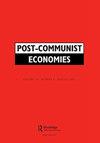International labour migration and people’s views towards economic and political systems in transition countries
IF 1.8
3区 经济学
Q2 ECONOMICS
引用次数: 0
Abstract
ABSTRACT During the 30 years of transition from communist regimes, the people’s views towards transition have varied from support to opposition. We empirically examine the influences of international labour migration on these views, using the survey data covering 28 transition countries in Europe and the former Soviet Union area and three points of time, 2006, 2010 and 2016, based on multivariate regression models. Our main findings are twofold. (I) Labour emigration to Western Europe increased people’s support for a market economy and democracy over a planned economy and authoritarian government, albeit a less robust result for democracy. This suggests the role of social remittances – migrants transmit their experiences and promote the support for transition among people remaining in the home countries. (II) However, immigrant inflows reduced these support, suggesting that the economic and cultural conflicts with immigrants made people sceptic towards liberal policies or nostalgic towards the communist era.国际劳工移徙和过渡国家人民对经济和政治制度的看法
在共产党政权转型的30年里,人们对转型的看法从支持到反对不一。我们基于多元回归模型,利用涵盖欧洲和前苏联地区28个转型国家和2006年、2010年和2016年三个时间点的调查数据,实证检验了国际劳动力迁移对这些观点的影响。我们的主要发现有两个方面。(1)向西欧的劳工移民增加了人们对市场经济和民主的支持,而不是计划经济和威权政府,尽管对民主的支持不那么有力。这表明社会汇款的作用- -移徙者传递他们的经验并促进留在原籍国的人对过渡的支持。(2)然而,移民流入减少了这些支持,这表明与移民的经济和文化冲突使人们对自由主义政策持怀疑态度或怀念共产主义时代。
本文章由计算机程序翻译,如有差异,请以英文原文为准。
求助全文
约1分钟内获得全文
求助全文
来源期刊

Post-Communist Economies
ECONOMICS-
CiteScore
4.90
自引率
18.20%
发文量
21
期刊介绍:
Post-Communist Economies publishes key research and policy articles in the analysis of post-communist economies. The basic transformation in the past two decades through stabilisation, liberalisation and privatisation has been completed in virtually all of the former communist countries, but despite the dramatic changes that have taken place, the post-communist economies still form a clearly identifiable group, distinguished by the impact of the years of communist rule. Post-communist economies still present distinctive problems that make them a particular focus of research.
 求助内容:
求助内容: 应助结果提醒方式:
应助结果提醒方式:


